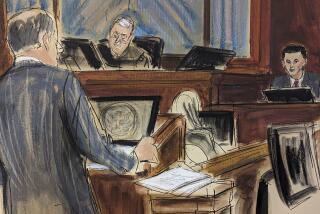Court Told FCA Executives Got Special Bonuses : Questionable Lending Practices Under Knapp Also Alleged; He Denies It
- Share via
The former management of Financial Corp. of America, led by the controversial Charles W. Knapp, provided key senior executives with more than $600,000 in “special management bonuses” to meet margin calls on FCA stock in 1984 when the stock was slumping, court records show.
FCA also paid more than $700,000 to high-level executives, including $227,000 to Knapp, so they could pay off the low-interest loans used to acquire FCA’s stock, according to one document that was recently unsealed in Monterey County Superior Court.
FCA is also said to have spent more than $100 million to support the price of its stock in 1984, including a disputed purchase by its employee ownership program that was financed by an affiliate of American Savings & Loan. Irvine-based FCA owns American Savings, the nation’s largest thrift.
These and other claims of questionable lending practices at FCA are part of a pending lawsuit in Monterey County in which a Pebble Beach hotel developer is suing American Savings.
A document two inches thick and only recently made public presents the case of FCA’s present management, headed by William J. Popejoy, against the former management, headed by Knapp. Federal regulators forced Knapp to resign in 1984 because they were angry with his fast-growth lending practices.
Says Actions Were Approved
The document provides the first detailed, insider account of allegedly suspect and sloppy loan practices that were in effect while Knapp was in charge of the company. The court papers were written by Popejoy in mid-1986.
The document is actually a so-called proof of loss statement submitted to three companies that provided fidelity bond and liability insurance for FCA’s previous management. Fidelity bond insurance protects a company against wrongdoing by its employees.
Knapp, through his lawyer, issued a blanket denial of the latest claims against him, pointing out that his actions as chairman and chief executive of FCA were always variously approved by the firm’s outside lawyers, independent accountants, internal audit committee and/or federal savings and loan regulators.
Arthur N. Greenberg, Knapp’s Century City attorney, called FCA’s proof of loss statement a “self-serving document” prepared to justify the insurance claims. “This payment would offset FCA’s ongoing operating losses,” Greenberg noted in a statement.
FCA is seeking nearly $100 million from the three insurance firms but, according to Greenberg, the firms are fighting the claims because “they’re not aware of any evidence of fraudulent misconduct” by Knapp.
The Popejoy-led management team claims that past misconduct has caused FCA more than $400 million in losses in recent years. American Savings has added $1.7 billion to its reserves for loan losses since Knapp resigned, and late last month FCA reported a $468-million loss for 1987 that wiped out the firm’s net worth.
Popejoy declined to elaborate on or explain his charges because, as his spokeswoman put it, “we’re involved in other pending litigation regarding these issues.”
The proof of loss papers, though, say that Knapp improperly manipulated the value of FCA’s stock in the spring of 1984, several months before he was forced to resign. Knapp and his family owned 1.46 million shares of FCA at the start of 1984, court records show.
Greenberg disputed the manipulation charges, saying that Knapp “never sold a single share of FCA stock while he was with the company.”
Stock Acquisition Questioned
The proof of loss statement was particularly critical of a pattern of insider stock purchases in 1984, shortly before the firm sustained a major deposit run that resulted in Knapp’s forced resignation.
These were FCA’s purchases of its own stock that were designed to shore up the price at a time when FCA’s loan practices were being increasingly criticized by savings and loan regulators in Washington and by financial analysts on Wall Street.
Among the stock transactions was a $42-million acquisition by FCA’s employee stock ownership program that was funded by American Savings International, an affiliate of American Savings that was incorporated in the Netherlands Antilles. But the proof of loss statement indicated that the purchase violated both federal labor laws and U.S. savings and loan regulations.
The proof of loss statement also detailed how FCA loaned three senior officials a total of $614,000 in the spring and summer of 1984 in order to meet margin calls on FCA’s stock, which was falling in value. Margin calls are demands on the investor to put up more collateral for stock bought on credit.
“Knapp made the decision that it was undesirable for senior executives to be perceived as selling stock in the company,” the court papers show, adding that “in order to meet the margin calls, senior officers were granted ‘special management bonuses’ or alternately obtained ‘loans’ ” from FCA.
The document went on to say: “The loans were generally low-interest rate loans, but as a matter of fact even the minimum interest was not paid. Rather, whenever an interest payment was required, bonuses were declared in order to permit the individuals to make the payment.”
The court papers also show that FCA paid $726,511 from 1980 through 1984 as “special bonuses” to its top officers, including Knapp, who had borrowed money to buy FCA stock. The bonuses were intended to pay the interest rate on those loans, some of which were as low as 4%, the proof of loss statement said.


